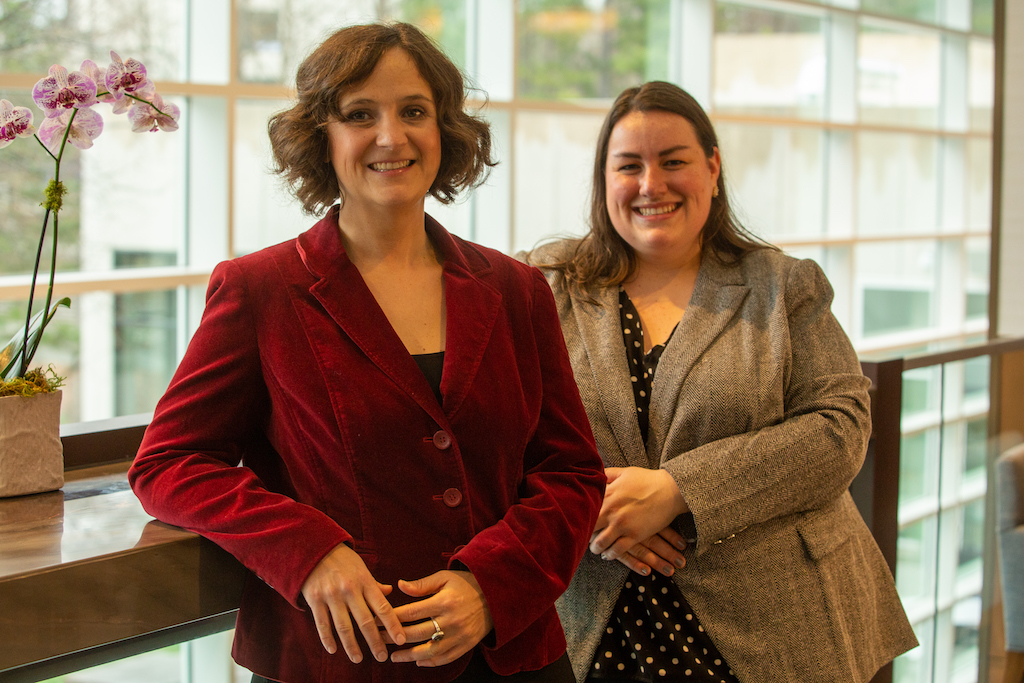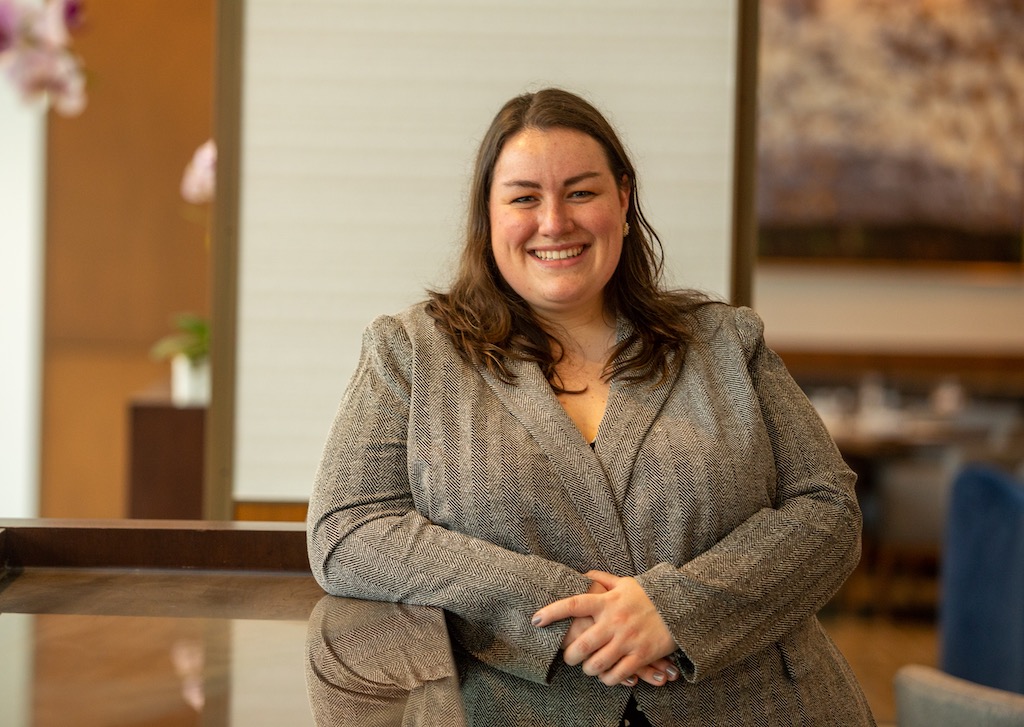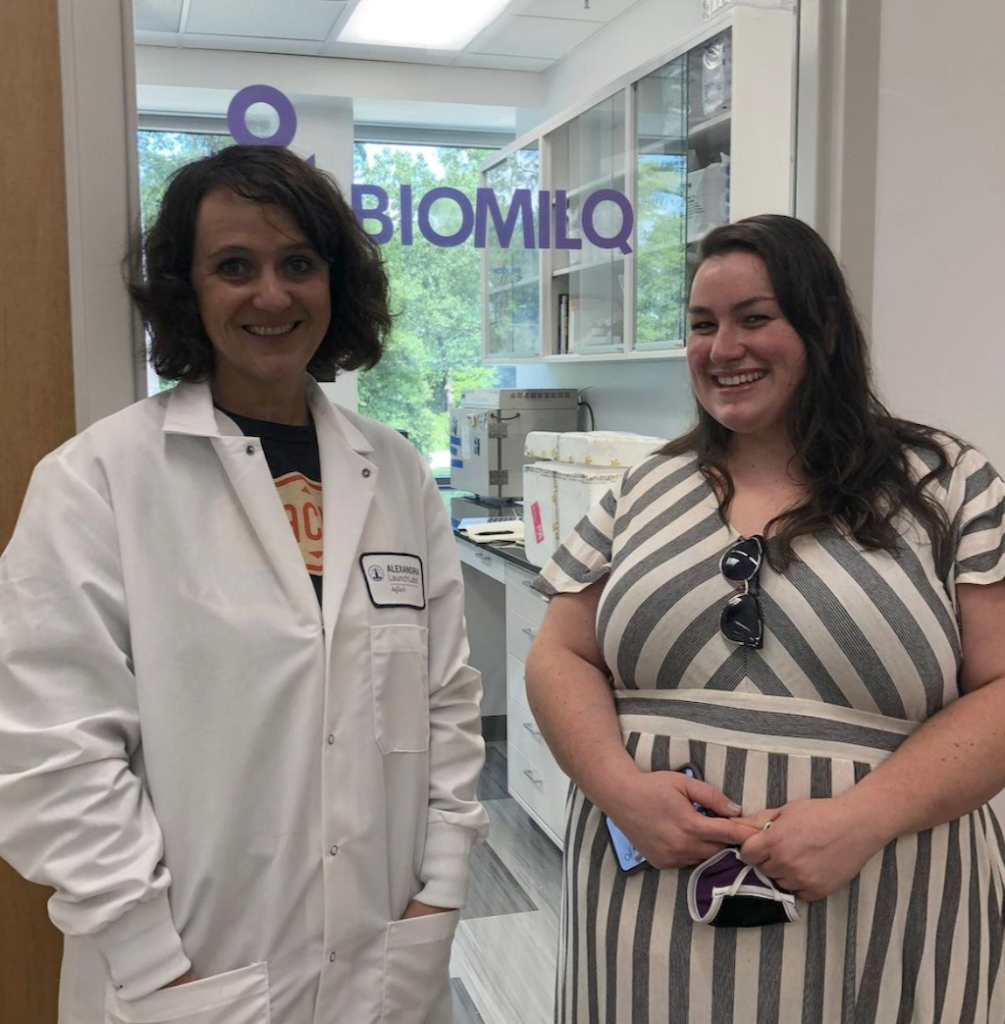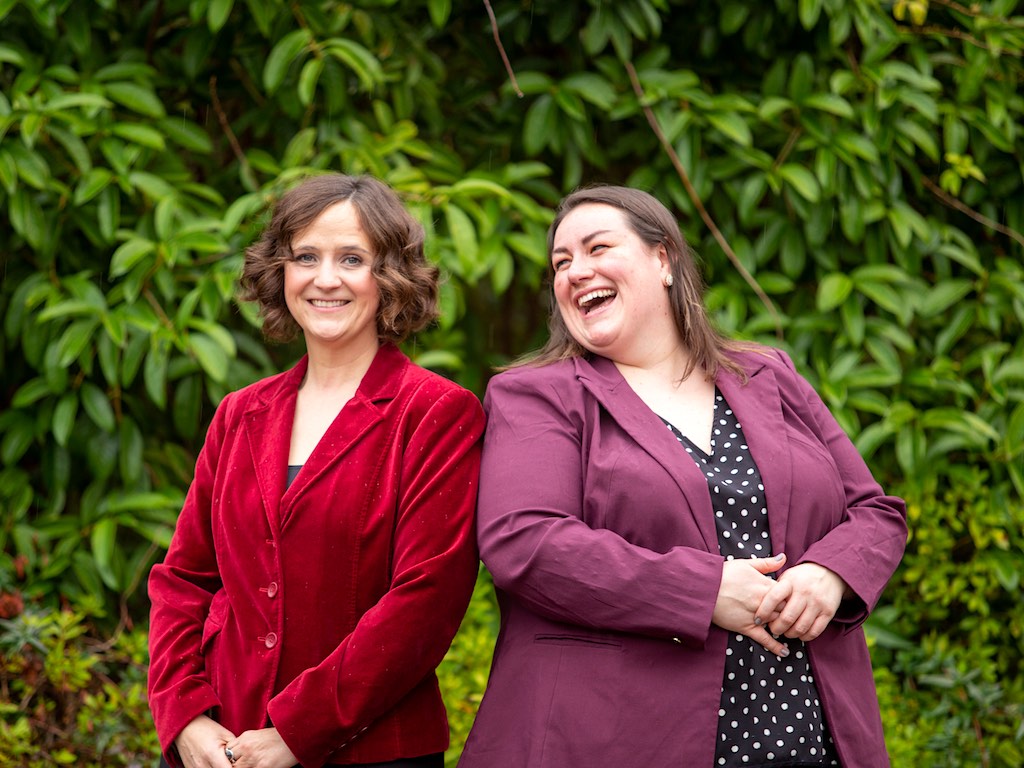Q&A w/ Biomilq Founder Michelle Egger: “I Can’t Wait To Bring Cultured Breast Milk To Mums Who Need It”
11 Mins Read
One year ago, Michelle Egger and Leila Strickland founded Biomilq, a cell-ag startup farming breast milk outside of the body – a development that could disrupt the enormous profit-driven infant formula industry as we know it. Biomilq’s solution is one that isn’t just more sustainable, but is one that matches the nutrition of real breast milk – what science has shown is the best and most optimal form of infant nutrition there is. For mothers who struggle with breastfeeding, it’s an alternative that doesn’t mean a trade-off in terms of health or the environment. The young startup has already earned the attention of figures like Bill Gates, and Egger tells us that she’s not stopping until everyone in need of Biomilq’s cultured breast milk can get it. In this interview, the co-founder and CEO tells us a bit more about her mission with the company, her passion that drives her work and what’s in store for Biomilq in the future.
GQ: Tell us a bit about your journey and how you ended up starting Biomilq with your co-founder Leila?
ME: Leila has been working on this since 2013. A mutual friend offered to make an introduction after I completed my summer at the Bill & Melinda Gates Foundation and phrased it as: There’s this crazy woman trying to make milk outside the body, do you want to meet her? If anyone phrases an introduction like that, I knew I absolutely had to take it – and they were so right.
It really felt like I could fit into a space where I could talk about things that really mattered to me – malnutrition, food access, food security – and utilising innovation and technology as a food scientist and as a business leader.
In my entire career as a food scientist, I’ve been focused on dairy fermentation, commercialisation and how we can use food systems for transformational change. I just wasn’t finding it in my corporate career, and so parted it for an MBA in social impact and entrepreneurship, which led me onto this long journey into how businesses can at least be neutral, and at best do no harm and be a force for good. It really felt like I could fit into a space where I could talk about things that really mattered to me – malnutrition, food access, food security – and utilising innovation and technology as a food scientist and as a business leader. Leila and I were a match made in heaven. She had the technological background and as someone who herself struggled with breastfeeding, she had insight into our consumer. I brought a lot of the understanding of the NGO-side, the breastfeeding space, understanding of infant nutrition and passion about how food systems can be better. It’s been a whirlwind of a year since we started. We’re not an infant anymore and it feels like we should be celebrating!

GQ: Why cultured breast milk? There’s been a lot of focus on cell-based meat and protein and even cultivated dairy, but there’s only two startups in the world focused on cultured infant milk (TurtleTree Labs being the other). How huge is the need and what’s the big problem with existing milk formulas, from both a health and environmental standpoint?
ME: From a health standpoint, pretty much all research agrees that in terms of infant nutrition, the human body is designed for human breast milk. It’s strange when you think about the fact that we consume cow’s milk to begin with. Over the course of millions of years in human evolution, we have developed human breast milk to support the life of humans, so from a nutritional profile it is optimised to be bioavailable, adjustable and in the right form for an infant to truly thrive on. It’s not that infant formula is entirely bad. Generations of humanity have now grown up on it and seem to be doing okay, but we know there’s so much more benefits of breastfeeding when it comes to immunological function, cognitive development, skeletal and muscle growth. It’s a hard challenge and tradeoff for parents.
We started specifically on human breast milk not because its profitable or because dairy is interested in it, but because there’s a need. The leverage point of being able to intervene to provide adequate nutrition to prevent disease, cognitive challenges, malnutrition that can cause stunting – that’s something that can change the future generations of humanity. This is where I get really excited. It’s one thing to talk about cultured dairy products and think about the environmental impact, but infant nutrition impacts all of us as people. We get to sell on benefits to mothers and babies, not on just sustainability. We don’t have to say: this is better for the planet, use it. We can tell a mum that this is as close as what you can get outside the body as possible and the rest is pretty seamless for them to truly understand and be ready to utilise the product.
GQ: There’s something about breast milk. Infant milk powder disrupted women’s ability to work outside the home. Do you see a future where dairy-based infant powder is no more?
ME: You know, I’m a strong proponent of nothing is no more. Trends change and times change. It’s true that 5-10% of the liquid global dairy market ends up in infant formula, making it a pretty substantial form of dairy to remove if we can. But it’s not going to be an overnight transition. There is definitely going to be space in this field for a variety of options for parents, especially as we bring down the cost of a product like this. Dairy-based formula is still going to be less expensive for some time, especially to a mother in rural Bangladesh. We’re working hard to get to there, where it’s differentially going to make an impact on their children’s development, but we’re realistic in that there has to be a set of slotted options. It’s going to be an evolution. We’re very cognisant that this is an emotional issue. This is challenging. We never mislead mums into believing that this will be a product available for them within the next year at the same price as formula, because it’s not. It’s going to be a lot of science and work to get us to a place where we can be cost competitive and accessible to as many mums as possible.
We started specifically on human breast milk not because its profitable or because dairy is interested in it, but because there’s a need.
GQ: Going back to the basics – how exactly does Biomilq develop cultured milk? What’s the process?
ME: We harness the ability of these cells to turn on their biosynthetic pathways to secrete all the nutrients of milk at once. Human mammary cells are really powerhouses of the body and are able to do all of the biosynthetic functions to create the full macro and micro nutrients of milk – all in perfect constellation. They produce everything into this milk fat globule in a usable form, and they do it in a way that when you can give them the right stimuli to be able to stay separate from media. This is really vital. If you’re not able to keep this separation of complicated media from complicated milk, you wouldn’t be able to separate them back out and maintain the nutrient capability later on. We still understand so little about the true value of when they’re in that full form, versus when we’re trying to recreate it piecemeal outside the body, which is what formula companies have been doing so far.
It’s really letting the cells do the heavy-lifting and being good shepherds to enable them to be safe, happy, well-fed and ready to produce milk.

It’s really letting the cells do the heavy-lifting and being good shepherds to enable them to be safe, happy, well-fed and ready to produce milk. In a cellular meat company, you’re raising Angus beef and you’re ready to harvest the cells all the time – but our cells aren’t harvested. We keep them happy to continue to produce milk, not utilising them as any source of protein in themselves.
GQ: Biomilq has done something that startups dream of – getting the backing of Bill Gates, who invested in the company’s US$3.5 million seed round through his investment firm Breakthrough Energy Ventures. What was that moment like?
ME: Anticlimactic… Can I say that? We worked really hard to get funders that were mission-aligned and believed what we were doing on a fundamental basis. Breakthrough Energy Ventures was a great partner and a wonderful lead to have. We’re really lucky, but fundraising in a pandemic is always a little awkward. The moment we saw the cheque clear, we were more like: let’s get to work. I’d love to say that we threw a big party or went on vacation, but we really just felt relieved that we have the aligned partners and now we can build a team, a lab and continue on with our experimentation and development.
GQ: On your website, Biomilq is described as “women-owned, science-led, and mother-centred”. How important is this female-led aspect of the company in still a very male-dominated world of biotech?
ME: I was actually talking to my team about this today. I don’t think we can authentically bring this product to market if we were a bunch of 50-something men in suits. I just don’t think anyone will buy or believe it – nor should they. This industry has been dominated for a long time by profit-driven individuals who have no regard for infant nutrition, mothers’ health and wellbeing, or the cognitive load of being a parent. Perhaps only some interest in improving nutrition, but in pursuit of more profit. That’s not why we’re here and it’s pretty clear from hearing directly from Leila, who was pumping in a closet alone, why this idea mattered. It’s really being centred on the fact that we are our core consumer, and it makes it easy for us to be a strong representative and advocate for her.
GQ: Do you have any advice for aspiring female entrepreneurs and founders?
ME: I always say that being a woman shouldn’t follow you around like a dark cloud when it comes to being a founder. Lots of people say: oh, it must be so hard being a female founder! I don’t feel like my femininity on an average day. I feel the resiliency of who I am and what I’ve experienced in my life to keep going. For Leila and a lot of other female founders we’ve spoken to, it’s not really that we feel like women and that makes us lesser in the business field. It’s that we’ve had to overcome other challenges, just like other entrepreneurs from challenging socioeconomic backgrounds, different racial disparities and institutional disparities. We feel the fact that we’ve been resilient in our role as female scientists already, and this is just kind of the newest iteration of feeling like there is something to overcome.
I don’t think we can authentically bring this product to market if we were a bunch of 50-something men in suits.
I do get a little disappointed. There’s a statistic that came out of a BCG report that 2.2% of VC funding in 2020 went to all-women led companies. That disappoints me because it says to me there’s a greater symptom of not good founders founding companies, but people trying to check boxes and trying to find female and diverse and minority founders. Good founders have overcome challenges – that’s what makes them good. It really has less to do with where they’re from and more to do with what they’re made of and what they’ve proven in their lives. I wish we focused more on finding strong passionate founders than people who appear to be a good fit on paper.

GQ: Can you share a bit about Biomilq’s plans? Is there a timeline for commercialisation?
ME: We are an underpromise and overdeliver organisation. We always say that 18 months from now we can have a product that can be commercialisable. But the FDA, the E.U. and other regulatory bodies around the world, even with the exciting news of cell-based meat being approved in Singapore, here we’re talking about feeding the most precious beings on the planet. So they’re going to require us to go through some extra steps, as they should, to prove that we’re safe and effective. Realistically, that means we’re about 3-4 years out from a product that is fully approved in full-form milk in the market that we can be proud of and ready to feed to our kids.
GQ: What’s your ultimate goal with the company?
ME: I want to see this product accessible to the hands of parents everywhere. I don’t want this to be a product that ends up with wealthy elite families in wealthy countries and doesn’t extend to anyone else because all children deserve adequate nutrition. We know that predominantly, a lot of children who would especially benefit from this product are in emerging nations throughout the world and I can’t wait to be able to bring this to mums who need it.
I don’t want this to be a product that ends up with wealthy elite families in wealthy countries and doesn’t extend to anyone else because all children deserve adequate nutrition.
GQ: Do you have any predictions for the alternative dairy industry in 2021?
ME: I think we’re going to see heat and excitement in this space. But I would caution that the dairy industry isn’t going anywhere. I think we get ahead of ourselves trying to convince people that this is happening and it’s here. We’re not going to be able to destroy a historic industry overnight. It’s not going to happen, and nor should it, in my opinion. I think there are many ways to reduce the climate change impact of bovine cow raising. Absolutely, we produce far too much and in an unsustainable manner. But there are also artisanal products made around the world that are not going to disappear immediately and I don’t think they should.
We need to think about ways to unlock potential sustainability measures in the supply chain. How do we ensure that some of the milk made in Switzerland by the same family for over 180 years are using better animal husbandry practices? We need to find ways to make the products of their ancestors in a climate-neutral manner. I look forward to it being less of a “we must destroy one industry to make room for another” and instead think about how to find a balance of coexistence where we are both climate-neutral and better for humanity.
GQ: We always ask this final question – team rice or team noodles?
ME: That’s the most difficult question ever! I think I will go with team rice, because if you asked me as a child, one of my favourite foods was wild rice. I’d be really sad if I chose noodles and couldn’t have wild rice anymore.
All images courtesy of Biomilq.




